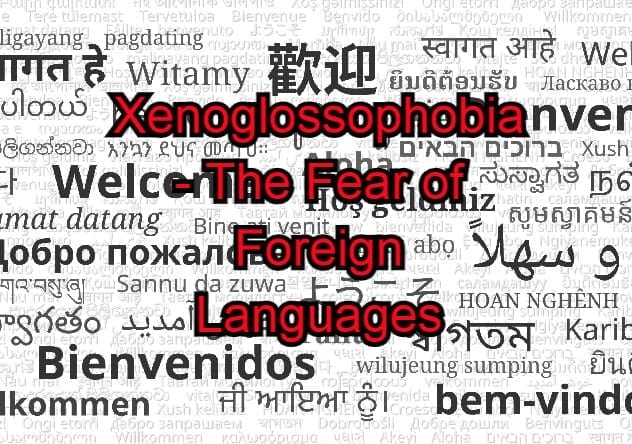Share This Article
Let’s Talk about the Fear of Foreign Languages, or Xenoglossophobia
Does the sound of people conversing in a foreign language send you into a state of panic? Has the thought of taking language lessons filled you with dread? Do you break into a sweat thinking about your foreign language lessons?
If you answered yes, you may be suffering from a fear of or an aversion to foreign languages, also known as xenoglossophobia.
Living with a fear of foreign languages can make it difficult for you to travel to or live in culturally diverse environments. This phobia can leave you feeling overwhelmed when even listening to a foreign language.
But that doesn’t mean you can’t change your situation.
With professional treatment, you can overcome this phobia. Begin by getting a proper diagnosis. Once that happens, move to better understand the root cause of your xenoglossophobia. Read on for more.

What Causes the Fear of Foreign Languages?
Xenoglossophobia causes can range from genetic or environmental factors to experiencing trauma. Most often, it’s a combination of different factors that causes one to become averse to foreign languages.
Sometimes, those with xenoglossophobia have a family history of mental illness or they themselves have a mental illness. Such conditions increase the risk of developing a phobia. Likewise, an individual who has undergone a traumatic event, such as a robbery or assault involving a person speaking a foreign language, are also at a greater risk of developing phobias such as xenoglossophobia.
Foreign language anxiety can also result from environmental factors, such as growing up with a parent or relative who suffers from an irrational fear, or a negative experience in a foreign language class.
Everything You Need to Know about Xenoglossophobia
Xenoglossophobia is a rare phobia on the irrational fears list. While xenoglossophobes suffer from foreign language anxiety, their fear can take many forms.
It can develop into a fear of others badmouthing them in a foreign language or a fear of performing poorly in a language class and being ridiculed. A xenoglossophobe may also believe that one’s language is better than other languages. It all depends on the cause behind their irrational thoughts regarding foreign languages.
Now, you may be wondering, “Is foreign language anxiety normal?”
Foreign language anxiety is uncommon. Recognizing xenoglossophobia in an individual often depends on where that person resides. For example, someone living in a culturally diverse region might recognize their symptoms more easily than someone residing in regions with low cultural diversity.
Looking for the symptoms of xenoglossophobia may make the condition easier to recognize.
Symptoms of Xenoglossophobia
Different people suffering from xenoglossophobia exhibit different types of symptoms. The occurrence and severity of symptoms also vary based on the cause of the fear.
Here are some common symptoms of xenoglossophobia that will help you diagnose yourself or someone you know.
Physical Symptoms
- Nausea
- Dry mouth
- Dizziness
- Sweating and trembling
- Rapid heartbeat
- Headaches
- High blood pressure
- Feeling faint
- Difficulty breathing
Psychological Symptoms
- Confusion
- Anger
- Irritability and mood swings
- Feeling helpless
- Fear of being judged/ negative evaluation
- Low self-esteem
- Fear of losing control
- Fear of dying
- Panic attacks
These symptoms may occur when one is around others speaking foreign languages or when thinking about foreign languages. These situations can act as triggers that bring an onset of either physical or psychological symptoms, such as panic attacks.
Prolonged exposure to triggers may also cause a person to relocate to a region where they won’t be exposed to triggers or foreign languages.
How Do You Deal with Xenoglossophobia?
What causes foreign language anxiety in one person may not have the same effect in another. And that’s why there’s no one cure-all treatment for xenoglossophobia.
However, there are ways to deal with and treat foreign language anxiety. It typically involves a combination of self-help along with professional treatment.
Self-Help — What Can You Do to Help Yourself?
Self-help can be your first step toward overcoming your fear of foreign languages. Here are some self-help solutions that can get you started on the path of recovery.
Meditation
Meditation is an easy way to relax your mind and body. It is also effective at reducing anxiety, including anxiety related to fear.
Exercise
Similar to meditation, exercise also helps reduce anxiety. Exercise also gets you moving, which improves blood circulation and decreases muscle tension, all of which can help prevent anxiety. From tennis and yoga to swimming and running, there are plenty of exercises you can pick up.
Healthy Diet
Poor diet and even mild dehydration can contribute to your anxiety. If you want to better cope with your phobia, a healthy, nutrient-dense diet is necessary.
Reducing Caffeine
A major culprit behind anxiety is caffeine. Caffeine in any form can cause anxiety to worsen. Whether it is coffee, tea or soda, reducing caffeine consumption during your treatment will benefit you.

Professional Help for the Fear of Foreign Languages – Available Options
Professional help for xenoglossophobia often involves different types of therapies. Take a look at some of the available options for xenoglossophobia treatment.
Exposure Therapy
Exposure therapy works by putting the patient through increasingly stressful scenarios involving the subject of their fear in a controlled environment. It aims to reduce the person’s panic response when encountering triggers.
Cognitive Behavioral Therapy (CBT)
CBT is a psycho-social intervention therapy that helps improve the sufferers’ mental health by working on negative patterns of thinking. It encourages movement away from irrational thought patterns and responses and towards development of more rational and measured responses to ones triggers.
Mindfulness-Based Stress Reduction (MBSR)
MBSR is a type of meditation therapy that involves mindfulness training to help reduce anxiety, increase self-esteem, and improve emotional regulation.
Dialectical Behavior Therapy (DBT)
DBT is a type of talk therapy that helps patients with regulating their emotions in response to fear.
Learning to Cope with Xenoglossophobia
Curing xenoglossophobia is a long journey, but learning the different ways to cope with this fear can make getting through it a whole lot easier.
Remember to rely on any kind of social support you can access, including friends and family. Be easy on yourself and accept mistakes as a part of the process. If you’ve already come this far, you’ve made huge progress.
As long as you keep practicing self-help techniques and keep getting professional help, you’re on the right track.
The Takeaway
Understanding the why, when, and how behind your phobia can help you learn to cope with it better.
Follow the steps mentioned above, and it will be only a matter of time until you, too, can watch foreign movies, take that foreign language class, or go on a trip abroad!
SOURCES:
https://optimistminds.com/xenoglossophobia/
https://blog.lingoda.com/en/what-is-xenoglossophobia/
https://www.daily-sun.com/printversion/details/460658/Xenoglossophobia



